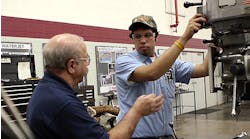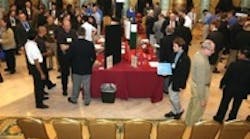William W. Sorensen — FEF Executive Director
The FEF's annual College Industry Conference is a networking opportunity for future engineers — and future employers.
In February of 2007, FEF will celebrate 60 years of carrying out its mission. Since 1947, the Foundry Educational Foundation, (FEF) has been building bridges between leaders in the metalcasting industry and engineering programs on college and university campuses in order to attract top level management replacements.
After WWII, during an economic boom period, the need for metalcasting engineers increased dramatically. Foundries and colleges were hard-pressed to meet the demands of the new burgeoning post-war economy. FEF was established to develop cooperative educational programs between foundries and technical education programs in metalcasting. In collaboration with industry leaders, societies and schools of higher learning launched FEF as a way to strengthen the foundry industry by assuring a steady supply of outstanding graduates in metalcasting engineering. FEF began offering scholarships, internships, and cooperative-education programs with technical schools, colleges and universities. As a result, these incentives helped to attract talented young men and women to pursue careers in metalcasting.
Over time, FEF began accrediting metalcasting programs at postsecondary schools to assure their quality and relevance to the rapidly changing and expanding foundry environment. FEF established a "Key Professor" at each accredited school to ensure that their FEF scholarship students were encouraged and mentored. As budgets on campuses became tighter, FEF began supplying discretionary funding to Key Professors in order for them to maintain the quality of their programs. Today, FEF also serves as the medium for equipment donations from industry to educational programs on campuses.
FEF hosts a national industry information session at the College Industry Conference, where outstanding students in metalcasting meet with industry leaders in North America to discuss careers in the metalcasting industry. Many senior level students at FEF-accredited schools make the contacts that secure future jobs. Metalcasting companies also post open jobs on the FEF website.
In later years, as the foundry industry became more and more competitive in the United States, successful industry leaders responded by emphasizing innovation and quality management. The metalcasting industry is now, as it was in 1947, changing rapidly, and in great need of highly qualified metalcasting engineers whose expertise must now include a broad array of business and professional management skills.
To further induce members of the younger generation into the metalcasting industry, FEF recently has undertaken a new educational project with the ASM International. The project is called "Foundry in a Box". Using adapted microwave ovens, the Foundry in a Box program allows high school students to experience "hands on" the process of melting metal and forming products in molds. The students are thrilled and shocked to watch molten metal become a usable tool. The hoped for result is that the students will see metalcasting as an innovative, high tech industry which will then lead them to consider a career in metalcasting.
Over its 60-year lifespan, FEF has evolved to meet the changing needs of the metalcasting industry. Today, the following programs are central to the FEF mission:
- Providing scholarships to outstanding students in postsecondary metalcasting education programs.
- Ensuring that college and university cast metals programs deliver strong academic and practical components.
- Ensuring that cast metal students on campuses receive the monitoring, mentoring and guidance they need to help them succeed.
- Providing opportunities for student internships in the industry.
- Bringing together industry leaders and students for career explorations and job interviews.
- Introducing young men and women to the metalcasting industry by sharing with them the experience and excitement inherent in the process of metalcasting.
There are 52 individuals elected to the FEF Board of Directors, as well as a dozen past presidents who represent industry leadership across the nation in all industry areas: production, quality assurance, education, research and development, consulting, sales, marketing, etc. Over half of the current Board of Directors were FEF students. They rose through the ranks of their peers and have come back to FEF to pass forward to new generations the same benefits they received from FEF and to ensure the strength of the industry far into the future.
In 1947, FEF was established as a charitable, 501(C) (3) tax-exempt, nonprofit organization, and it has relied solely on individual donor and corporate donor support to carry out its mission. FEF maintains a small three-person staff and involves its volunteer leadership in its daily programs. Every year, approximately 89% of all funds received have been disbursed for scholarships and program support. Immediately upon graduation from a college or university, approximately 72-75% of all FEF scholars begin working in the metalcasting industry. If we were able to track all of the students, we might find that the actual percentage employed in metalcasting or pursuing additional education in metalcasting engineering or research might be even higher than this. Lists of volunteers, donors and scholars, and detailed information about program services, are available on the FEF website, www.fefinc.org.
Over the past 10 years, the number of U.S. foundries decreased by more than 20%, from 3,000 to 2,190. During the same period, dollars disbursed by FEF to support students and schools increased by 56%, from an average of $150 per operating foundry (1996) to an average of $335 per foundry, an increase of 122%. As the number of foundries has decreased, FEF's financial support of outstanding students in metalcasting education and of postsecondary programs in metalcasting has continued to climb.
Between 1996 and 2006, 2,243 students in metalcasting received FEF scholarships. Based on that information alone, it's conceivable that there is at least one FEF scholar working at every one of the 2,190 foundries operating in the U.S. With such a sterling record of accountability, effectiveness, and impact, FEF surely has brought its vision to reality.
While we at FEF are proud of this record of achievement, we understand that the Foundation's success depends primarily on the generosity of donors and the hard work and dedication of volunteers. We thank all of you who have donated generously and contributed time and effort to the mission of FEF.
Bill Sorensen has been the Executive Director of FEF for 24 years. At the World Foundry Conference in Harrogate, England, June 47, 2006, he was awarded the VK Medal by the Foundry Educational Trust. The award commemorates the life and work of Voya Kondic, a revered metalcasting academic who did most of his work at the University of Birmingham, in England. Sorensen was the first American, and the first non-academic, to be so honored.









